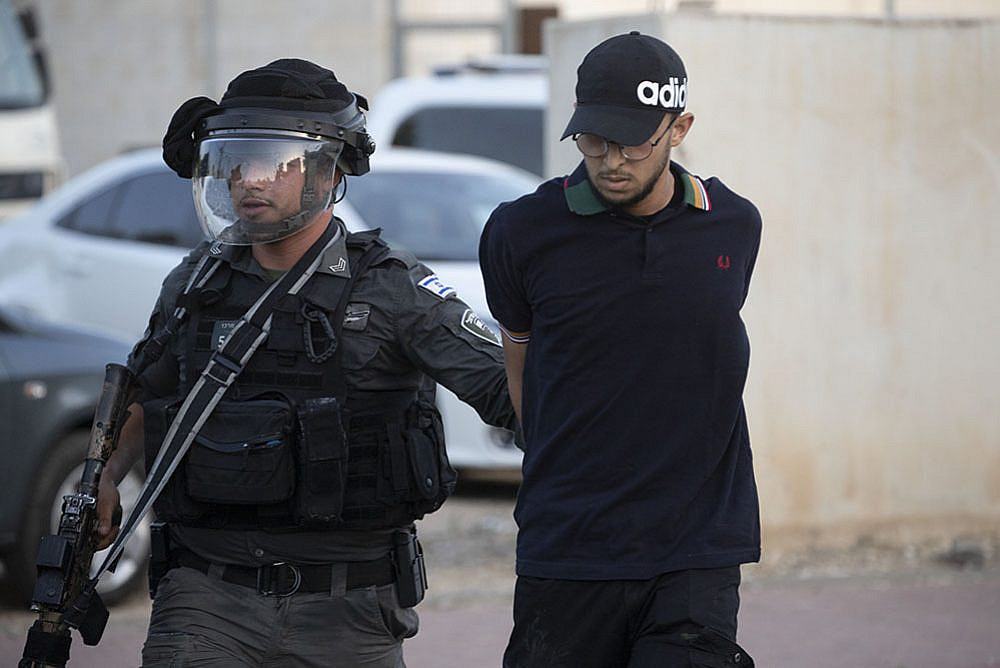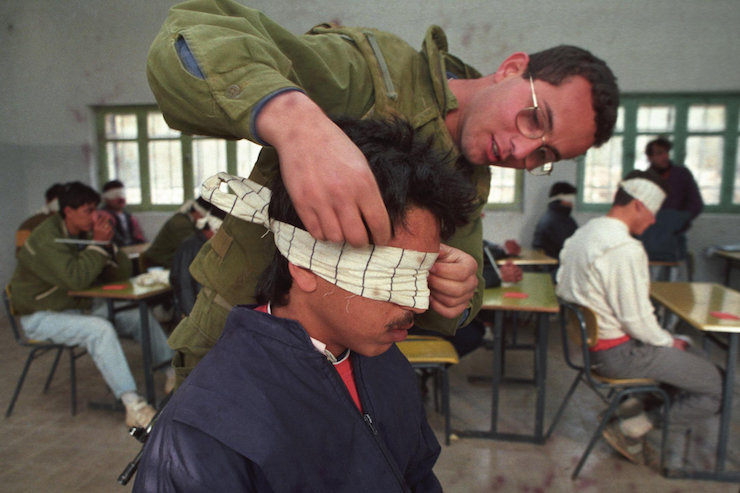Omaiyer Lawabne was withdrawing money from an ATM in Nazareth on May 11, the eve of Eid al-Fitr, the holiday marking the end of the holy month of Ramadan, when police forces descended on the area. Nearby, Palestinian citizens were protesting against the forced expulsion of families in the Jerusalem neighborhood of Sheikh Jarrah.
“I immediately started to walk away, slowly, in order to distance myself, as I wasn’t even part of the protest,” said the 21-year-old Lawabne. Some of the officers appeared to be special units and were heavily weaponized, he recalled. “At one point, I looked to my right and saw a police officer in full riot gear running toward me with his fist raised in the air to hit me.”
Lawabne wanted to stop and explain to the police that he had not done anything. But before he could even begin to reason with them, police threw stun grenades at him.
“I started running to escape but a police officer hit me in the left eye and I fell on the ground,” said Lawabne. Several officers then gathered around him and began beating, kicking, and punching him with their boots. Minutes later, two cops dragged Lawabne to Nazareth’s police station, where he tried to reason with them once again, to no avail. They accused him of throwing stones and causing fires — even though he hadn’t taken a part in the protest.
At the station, Lawabne was taken to a room where he saw other detainees. They were forced to sit on the floor with their legs folded under their bodies and their heads held down, he said. A masked officer was going around the room beating the detainees who would raise their heads with an object that Lawabne could not identify — “I couldn’t tell if it was a club or something else,” he said.
When the officers pushed Lawabne into one of the corners, he lowered his head and curled up. “Nevertheless, the same police officer hit me hard on the head with that object,” he said.
Lawabne then felt very dizzy and his head started bleeding. The officers forced him to place his head under running water. When he refused, and instead requested medical help, one of the officers told him to shut up and hit him in the stomach.
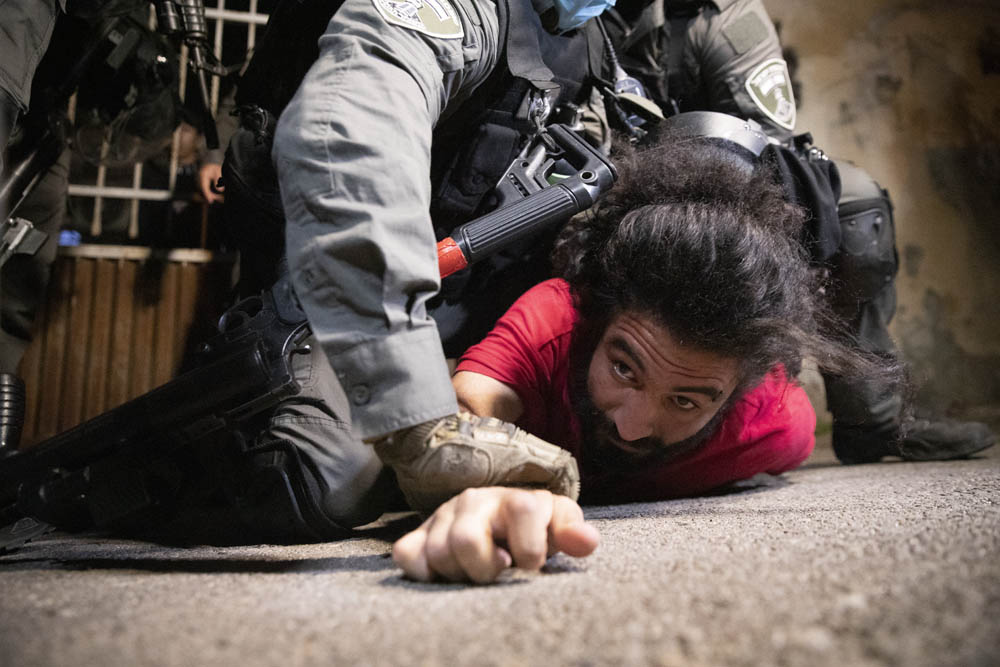
A few minutes later, two paramedics inspected Lawabne’s head wound and decided to take him to the hospital. When the ambulance arrived, the officer who hit him in the head lied to the paramedics about what had happened, claiming Lawabne was hit by a stone hurled during the protest. At the hospital, Lawabne had to get stitches on his head.
Lawabne’s isn’t the only case: testimonies from former Palestinian detainees who were held at the Nazareth police station in May reveal rampant and systemic Israeli police attacks on Palestinian citizens of Israel, including protesters, minors, innocent bystanders, and even attorneys. The graphic statements collected by the Palestinian legal center Adalah, which include physical, verbal, and psychological abuse, indicate that Israeli officers ran a “torture room” inside the Nazareth police station.
+972 Magazine reached out to the Israel Police Spokesperson Unit with questions about whether it was aware of the abuse at the Nazareth police station, and whether it was going to investigate the allegations, but it did not respond by the time of publication.
Beatings rise to the level of torture
Throughout May, Israeli police detained more than 1,900 Palestinian citizens of Israel, following a Palestinian uprising against Israeli state violence in Jerusalem and mob attacks in coastal cities such as Jaffa, Haifa, and Lydd. As of May 24, a police spokesperson told the New York Times that at least 70 percent of those arrested were Palestinian citizens.
Adalah received many complaints of police violence that occurred between May 9 and May 14, according to Adalah attorney Wesam Sharaf, who said the organization also documented bruises from beatings and torture that were visible on the detainees as they were brought into courtrooms over the past few weeks.
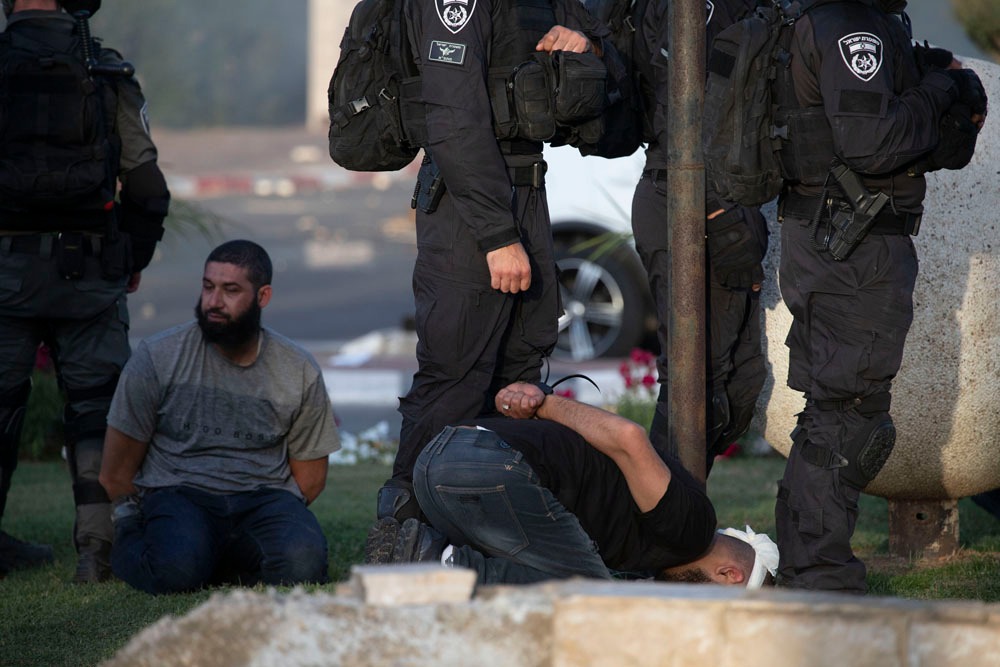
“After many of those detainees were freed, we started to collect testimonies and we met with eight people who were attacked and detained at the Nazareth police station,” said Sharaf. “Three of them were attorneys and one was a paramedic who tried to treat the detainees despite police obstruction.”
Adalah filed a formal complaint with senior Israeli officials on June 7 over “serious failures on the part of Israeli police and investigators in Nazareth that amounted to grave criminal offenses,” added Sharaf.
“The people inside the interrogation room are disconnected from the outside world and cannot make contact with anyone but the interrogator — which in itself is scary,” said Sharaf. At the police station, officers reportedly beat detainees, forced them to sign documents, and deprived them of necessary medical treatment — all acts that Adalah believes rise to the level of torture.
There were also visible signs of torture on the bodies of Palestinian citizens of Israel who appeared in courts in other cities, Sharaf noted.
“This makes us believe that similar things happened to detainees in other police stations, such as Haifa and in the Negev,” he added, saying Adalah will be investigating those cases as well. “This isn’t a new phenomenon; it’s only a continuation of Israel’s harassment of Palestinian citizens of Israel since the Nakba in 1948,” Sharaf remarked.
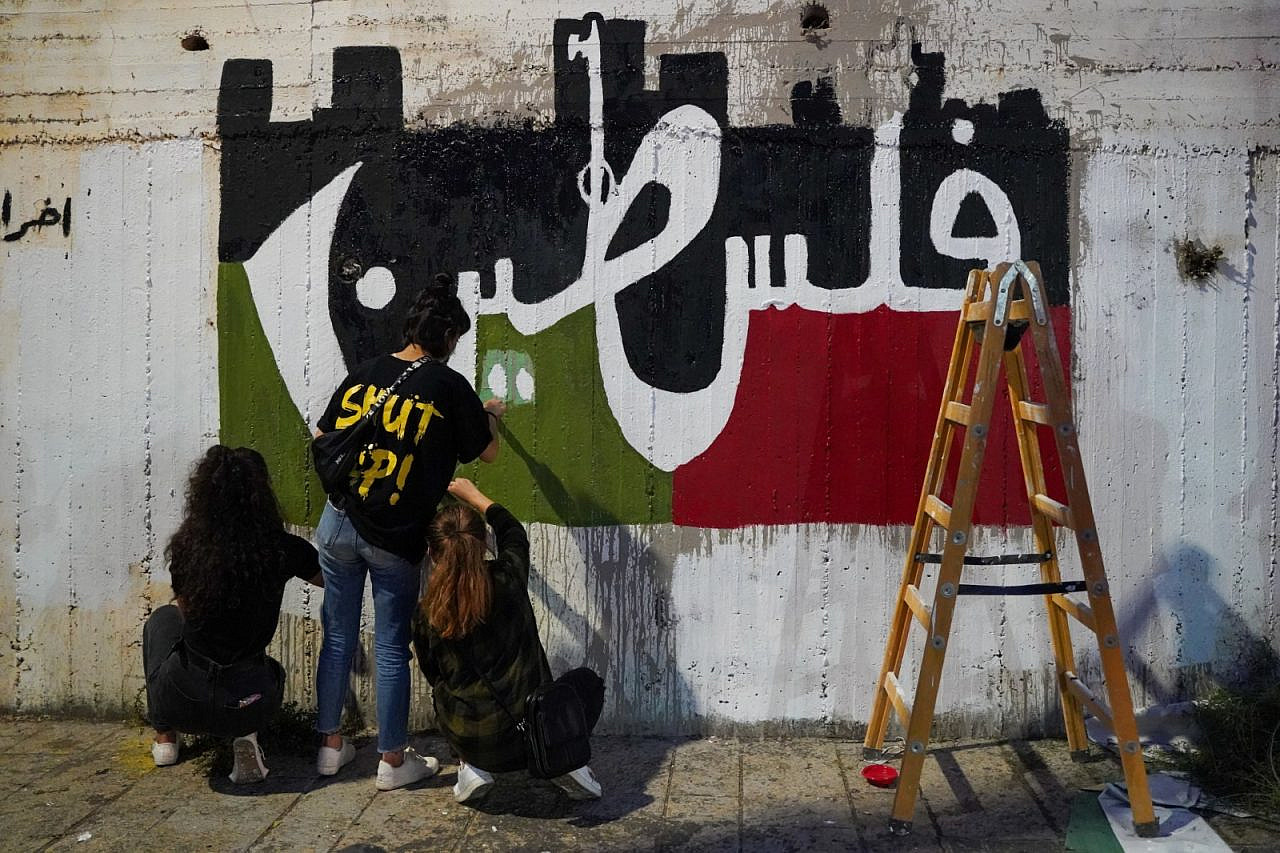
According to Itamar Mann, an associate professor at the University of Haifa Faculty of Law and legal adviser at the Global Legal Action Network (GLAN), some of the acts described in the affidavits Adalah collected may amount to inhuman and degrading treatment, while others may reach the level of torture — all violations of the International Covenant on Civil and Political Rights, which Israel ratified in 1991. Israel’s High Court officially banned the use of torture in a landmark ruling in 1999.
However, the justices on the case provided loopholes to the prohibition, allowing interrogators to continue using torture by invoking a vaguely defined “necessity defense.” The Israeli legal system has developed certain exemptions from responsibility for officials inflicting inhuman and degrading treatment on detainees “when this occurs under conditions of a ‘ticking bomb,’” when information may prevent imminent attacks, explained Mann. “Assuming the facts reported by Adalah were accurate, most likely it does not look like any such justification can be invoked in this case,” he said.
The torture of Palestinians by Israeli state agents is not at all new, said Mann, and its roots lie in the fact that Israel always showed a certain suspicion toward its non-Jewish populations.
‘A system unable to execute justice’
Israel’s use of torture against Palestinians in the occupied territories is “very common,” said Tal Steiner, executive director of the Public Committee Against Torture in Israel (PCATI).
Under the pretext of preventing terrorism, the Shin Bet, Israel’s internal security agency, uses practices of torture against detainees to extract information and allegedly prevent acts of future terrorism, added Steiner. “But we also see it as a way of putting people on trial, forcing confessions, and there are cases that indicate the use of torture as a political tool,” she said.
At least 1,300 complaints of torture have been filed in the past 20 years, said Steiner, though the Shin Bet refuses to release exact numbers. However, only two cases have been investigated, and not a single Shin Bet officer has ever been indicted. “It is a manifestation of a system that is unable to execute justice,” she said.
“When PCATI representatives visit detention centers and meet with Palestinian detainees, we hear dozens of torture accusations each year,” said Steiner. Last year, PCATI noticed a sharp rise in testimonies of torture, she added.
According to Steiner, Shin Bet activity targeting Palestinian citizens of Israel is limited to isolated incidents, whereas PCATI has identified extensive use of torture by police in Israel. “We have seen widespread systematic abuse by police officers against people who were arrested during legitimate protests, which is something very concerning that PCATI is following up on” she said.
‘I was fearing for my life’
Shadi Banna, a 19-year-old Palestinian resident of Nazareth, was participating in a protest in the city on May 9 when Israeli police arrived to disperse the demonstration. “We were peacefully standing in the march, chanting and singing in order to express how we feel, and to highlight the injustice happening in Sheikh Jarrah, when suddenly the Israeli police stormed the area,” said Banna. “When police fired a stun grenade next to me, I had to escape.”
While seeking shelter behind a door from stun grenades and tear gas, Banna was attacked and detained by an officer from the mista’arvim unit, a name for Israeli undercover agents disguised as Palestinians. “I thought he was a protester seeking shelter, so I wanted to help him, until he tried to arrest me,” Banna recalled. “When I resisted, he hit my head against the door’s handle.”
After the undercover agent handed him over to the police, Banna said he was beaten in the street by four Israeli officers. Along with a group of other protestors, he was then transferred to the Nazareth police station,
“My head was bleeding all the way to the police station and there was no medical assistance,” he said. Banna did not know what he was being accused of. “They were arresting people randomly, just to break up the activity,” said Banna.
At the station, Banna was further abused, verbally and psychologically. “We were held in a room with two police officers who prevented us from speaking to each other and kept harassing and attacking us, despite my head injury,” Banna recounted. “They humiliated us and called us flies every time someone tried to say something.”
In the interrogation room, Banna was not even asked any questions. Rather, the Israeli interrogator bargained with him to sign a house arrest paper or return to the same cell with the other detainees until further notice, without receiving any medical treatment.
“I was indirectly forced to sign the paper, otherwise I wouldn’t have been able to go to the hospital to treat my injury,” said Banna. “I told the interrogator that I wasn’t able to focus or read what’s written, but in the end, I had to sign, as I was fearing for my life.”
“As a Palestinian citizen of Israel, I’m not guaranteed the same rights as Jewish citizens; I don’t feel safe,” Banna related. “I feel like the Israeli police isn’t there to protect us and save us, but to destroy, oppress and silence us.”
Police response received on June 16:
Over the past few weeks, the police have been working with increased forces throughout the country to prevent incidents of violence and disturbances in order to maintain the safety and security of the entire public. The police forces in the city of Nazareth have dealt with a large number of violent incidents, including arson, throwing stones at police stations, throwing stones at police officers and civilians, and even firing massive fireworks at a police station. During the incidents, over 120 suspects were arrested and all incidents included police presence.
We emphasize that the Investigations and Intelligence Division officer contacted the director of the division on behalf of the Public Defense and requested the presence of defense attorneys at the station, and accordingly, when the detainees arrived at the station, two defense attorneys were present to advise the detainees.
Unfortunately, some of the lawyers complaining about the appeal were the ones who were at the entrance to the station and tried to create provocations on the spot. They were periodically allowed to enter the station and tour the facility in order to prove that the detainees were being treated properly. It should be noted that a medical staff was present at the station at all times and any detainee in need of medical treatment was transferred [to the hospital] without delay, and in some cases was summoned for questioning only after receiving treatment. To the extent that a claim is made by a suspect about the manner of his arrest, they may contact the relevant authorities accordingly.

